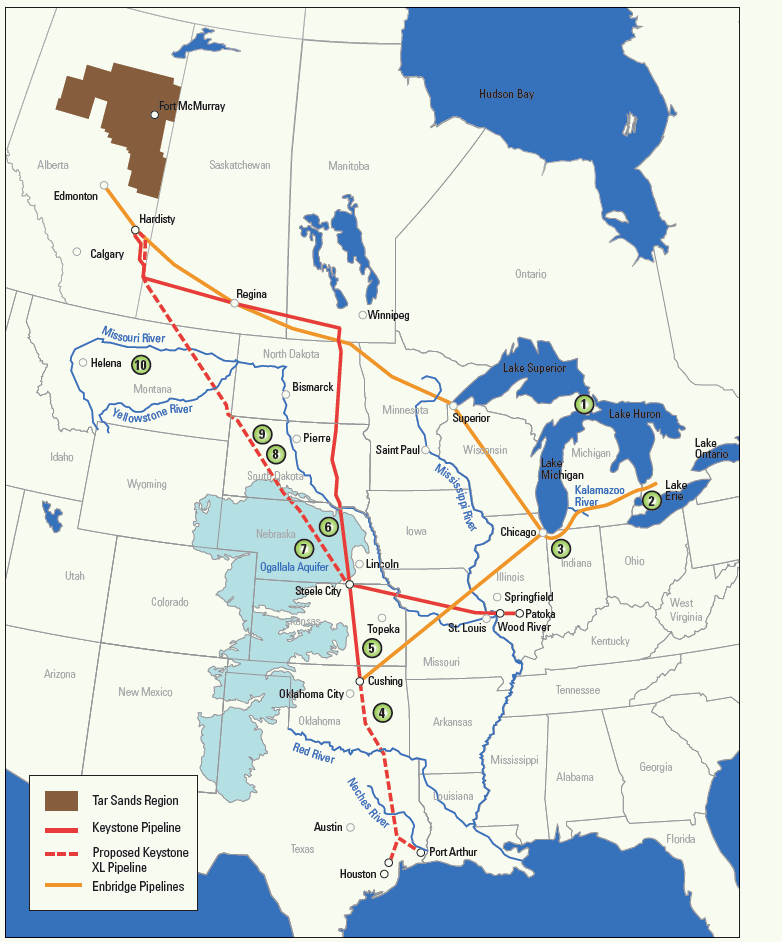NATURAL RESOURCES DEFENSE COUNCIL, NATIONAL WILDLIFE FEDERATION, PIPELINE SAFETY TRUST, SIERRA CLUB
Executive Summary
Tar sands crude oil pipeline companies may be putting America’s public safety at risk. Increasingly, pipelines transporting tar sands crude oil into the United States are carrying diluted bitumen or “DilBit”—a highly corrosive, acidic, and potentially unstable blend of thick raw bitumen and volatile natural gas liquid condensate—raising risks of spills and damage to communities along their paths. The impacts of tar sands production are well known. Tar sands extraction in Canada destroys Boreal forests and wetlands, causes high levels of greenhouse gas pollution, and leaves behind immense lakes of toxic waste. Less well understood, however, is the increased risk and potential harm that can be caused by transporting the raw form of tar sands oil (bitumen) through pipelines to refineries in the United States.
Currently, tar sands crude oil pipeline companies are using conventional pipeline technology to transport this DilBit. These pipelines, which require higher operating temperatures and pressures to move the thick material through a pipe, appear to pose new and significant risks of pipeline leaks or ruptures due to corrosion, as well as problems with leak detection and safety problems from the unstable mixture. There are many indications that DilBit is significantly more corrosive to pipeline systems than conventional crude. For example, the Alberta pipeline system has had approximately sixteen times as many spills due to internal corrosion as the U.S. system. Yet, the safety and spill response standards used by the United States to regulate pipeline transport of bitumen are designed for conventional oil.
DilBit is the primary product being transported through existing pipelines in the Midwest and would be transported in a proposed pipeline to the Gulf Coast. DilBit pipelines threaten ecologically important lands and waters from the Great Lakes to the Ogallala Aquifer. Moreover, the United States is on a path to lock itself into a long-term reliance on pipelines that may not be operated or regulated adequately to meet the unique safety requirements for DilBit for decades to come.
There are several steps that the United States can and should take in order to prevent future DilBit pipeline spills. These precautionary steps are essential for protecting farmland, wildlife habitat, and critical water resources— and should be put in place before rushing to approve risky infrastructure that Americans will be locked into using for decades to come:
- Evaluate the need for new U.S. pipeline safety regulations. Older safety standards designed for conventional oil may not provide adequate protection for communities and ecosystems in the vicinity of a DilBit pipeline. The Department of Transportation (DOT) should analyze and address the potential risks associated with the transport of DilBit at the high temperatures and pressures at which those pipelines operate and put new regulations in place as necessary to address these risks.
- The oil pipeline industry should take special precautions for pipelines transporting DilBit. Until appropriate regulations are in place, oil pipeline companies should use the appropriate technology to protect against corrosion of their pipelines, to ensure that the smallest leaks can be detected in the shortest time that is technologically possible, and companies should ensure sufficient spill response assets are in place to contain a spill upon detection.
- Improve spill response planning for DilBit pipelines. Spill response planning for DilBit pipelines should be done through a public process in close consultation with local emergency response teams and communities.
- New DilBit pipeline construction and development should not be considered until adequate safety regulations for DilBit pipelines are in place. The next major proposed DilBit pipeline is TransCanada’s Keystone XL pipeline. This pipeline approval process should be put on hold until the U.S. Department of Transportation Pipeline and Hazardous Materials Safety Administration (PHMSA) evaluates the risks of DilBit pipelines and ensures that adequate safety regulations for DilBit pipelines are in place.
- Reduce U.S. demand for oil, especially for tar sands oil. The United States can dramatically cut oil consumption by reinforcing existing reduction programs, such as efficiency standards for vehicles, and through new investments in alternatives to oil.
 Download full report (PDF): Tar Sands Pipelines Safety Risks
Download full report (PDF): Tar Sands Pipelines Safety Risks
About National Resources Defense Council
www.NRDC.org
“NRDC is the nation’s most effective environmental action group, combining the grassroots power of 1.3 million members and online activists with the courtroom clout and expertise of more than 350 lawyers, scientists and other professionals.”
Tags: National Wildlife Federation, Natural Resources Defense Council, NRDC, NWF, Pipeline Safety Trust, Pipelines, Sierra Club






 RSS Feed
RSS Feed